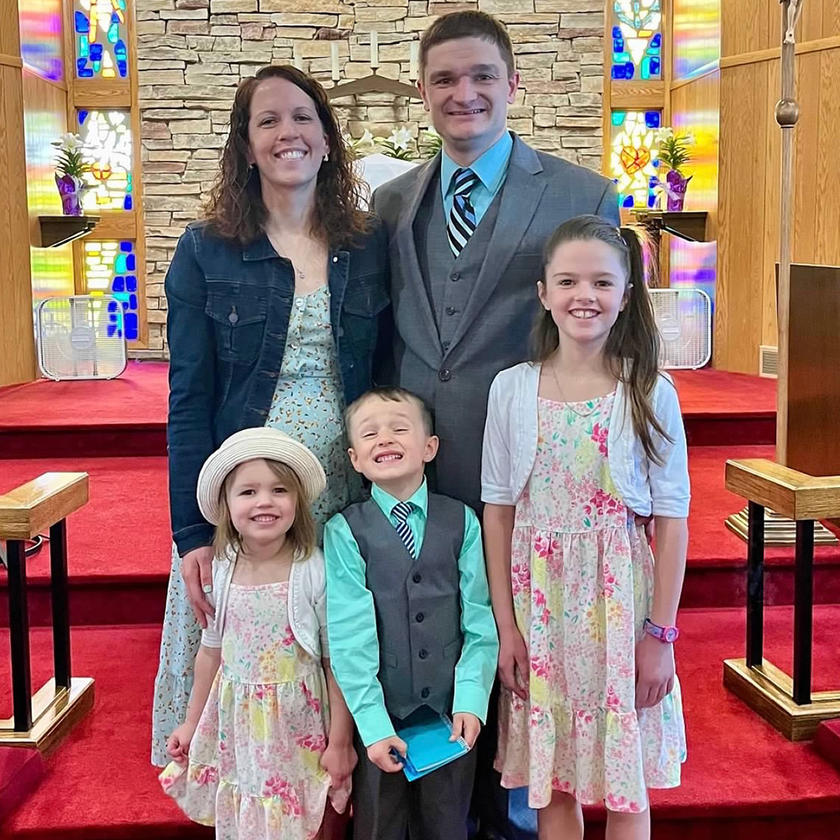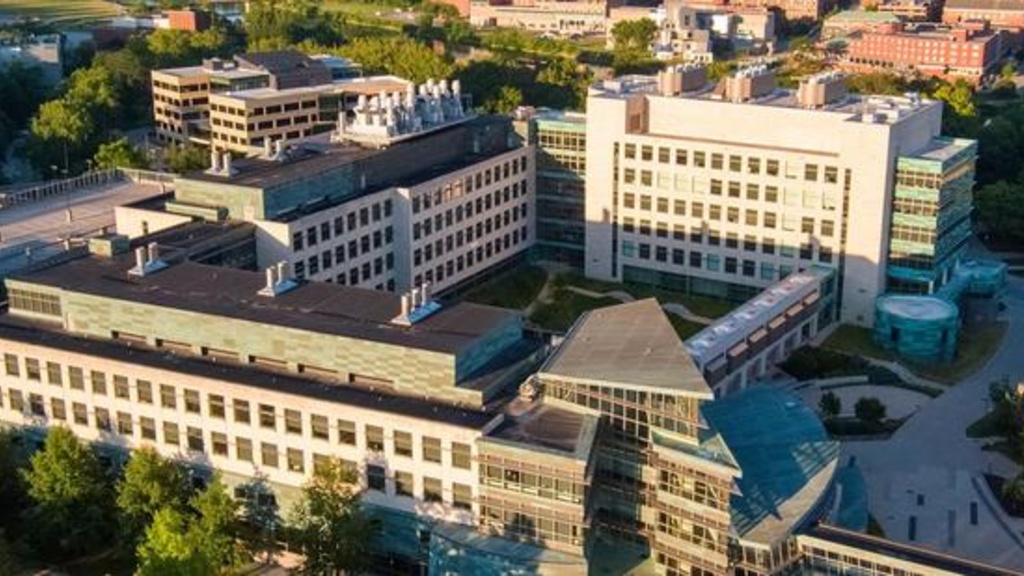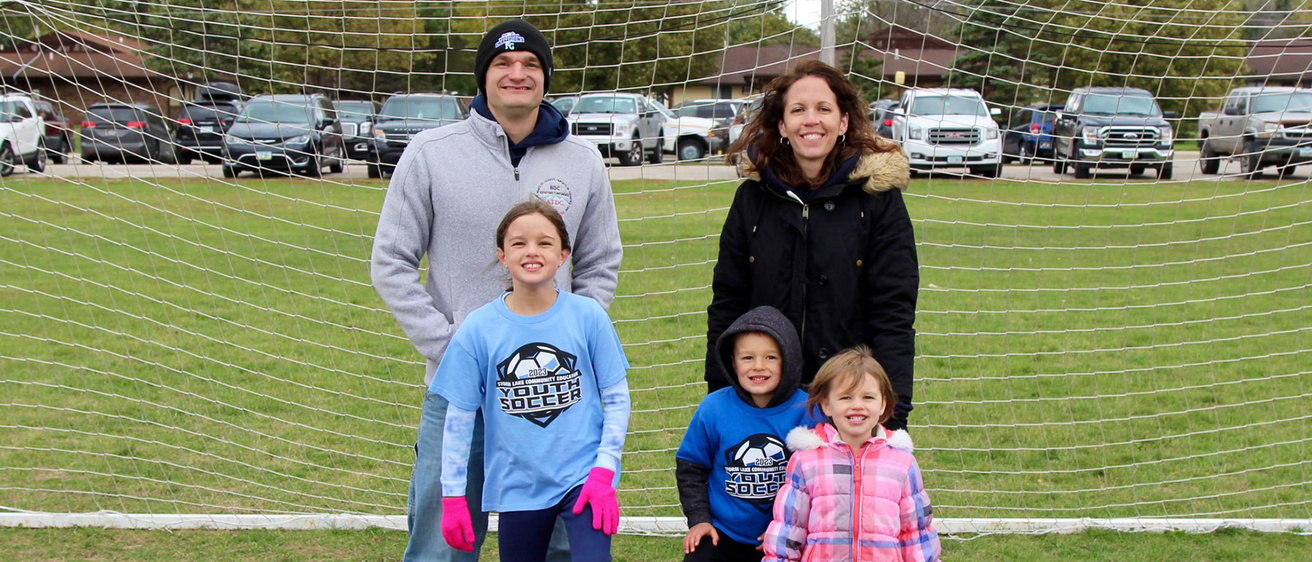Carver College of Medicine grad Kyle Glienke reflects on his calling to rural and agricultural medicine and his place in Storm Lake, Iowa — the community he loves.
Story: Celine Robins
Photography: courtesy of Kyle Glienke
Published: Sept. 17, 2024
Kyle Glienke, MD, has deep roots in northwest Iowa.
He grew up helping milk the cows in the morning on the family farm near Aurelia. His mother was a nurse at the hospital where he now works. He lives on an acreage just outside of Storm Lake with his wife, Ashlee, and their three young children.
“It’s a wonderful place to raise a family,” Glienke says. “We both live close to our parents, and that’s awesome. They can help out, and they get to see the kids’ ball games.”
Glienke serves patients in Storm Lake at UnityPoint Family Medicine—Buena Vista and Buena Vista Regional Medical Center. He also is vice president and medical director for UnityPoint primary and specialty clinics in the Fort Dodge area.
When he’s not serving patients, participating in church activities, or coaching his kids’ sports teams, he’s often working on the farm with his dad and brother. They raise beef cattle, corn, soybeans, and hay.
“That was really important to me for work-life balance,” he says. “I enjoy working with my hands to feel like I accomplished something. Farming does allow for a little bit of that satisfaction.”
For Glienke, working on the family farm is a way to stay connected to his own roots and to the experiences and hardships of the patients he serves.
“I talk with my patients about how the crops look and what the prices are like. I think people appreciate that,” Glienke says. “It’s nice when you can be cared for by somebody who has the same background, the same set of values. And I do share that with the folks out here, that’s for sure.”
“It’s a lot of work, but boy, is it rewarding. … You can be an engaged part of the community. You can lift people up along with you. We do a lot for our patients, and not just from the broad spectrum of care. We really care for them and their community.”
The differences between rural and urban medicine
He first began to realize his calling to serve in a rural area during medical school, when he took an elective course on agricultural medicine.
“Basically, it was learning what health care looks like in rural Iowa, and specifically, when you’re taking care of farmers,” Glienke says.
That course became the foundation of his career in rural medicine. Rates of many diseases are similar between rural and urban groups, he says, with some exceptions: Heart disease and chronic obstructive pulmonary disease (COPD) are more prevalent in rural populations, for example.
But one of the more subtle differences is his patients’ attitudes toward health care.
“There’s a tendency to think you should lift yourself up by your bootstraps, which might prevent people from presenting as quickly as in other places,” Glienke says.
The work of farming comes with a risk of work-related injuries, which Glienke says is intensified when some farmers use equipment outside of its normal specifications.
“There’s a spirit of ingenuity and independence to the American farmer,” he says. “Maybe we modify the equipment, and then it’s not quite as safe as it should be. Maybe we use something beyond its expected duration. So, we end up with more troubles from a trauma aspect. We have to know how to respond to these traumas quickly and equip our rural hospitals with the services they need.”
Rural practice also presents additional challenges in health care delivery. It can be more difficult to get patients to appointments with cardiologists, pulmonologists, or other specialists.
“The overarching question is: Do you build better roads to make it easier for people to get to the specialty care, or do you recruit more doctors to rural areas?” Glienke says. “But that can be harder to do over time.”

Kyle Glienke, seen here with his family, loves calling northwest Iowa home. “It’s quiet. I don’t have traffic,” he says. “I see my patients at ballgames. I see my coworkers when we’re both out getting ice cream at night. Being an integral part of the community is just a wonderful thing. I can make a really big difference here.”
Physicians in rural areas are used to taking on a broader scope of care for their patients to try to bridge that gap.
“We’re using telemedicine, and we’re thinking outside of the box as much as we can to make things available,” Glienke says.
Glienke is board certified in family medicine and internal medicine. The additional hospital-based training has helped him when specialized care is needed beyond the traditional role of a family physician.
“I practice broad-spectrum family medicine, from delivery and OB care to well child visits to spending time in the hospital with patients with chronic diseases,” he says. “I feel really comfortable in the hospital just from having that dual board certification and a little more training in hospital medicine.”
‘I was meant to be a doctor in Storm Lake’
Glienke gets a deep sense of fulfillment from caring for his neighbors and community members.
“We have a patient population here that is fun and diverse. And especially during the pandemic, my extra hospital training really fit in,” he says. “I think I was meant to be a doctor in Storm Lake. I have a very strong feeling of purpose here.”
He shares that sense of purpose with the next generation of health care providers by mentoring students from the college’s Carver Rural Iowa Scholars Program and medical and physician assistant students on rural rotations.
His advice to students considering serving in rural areas: “It’s a lot of work, but boy, is it rewarding.
“When you feel responsible for everything that happens with the community’s health, sometimes it’s really hard to turn it off,” he says. “But the point is that it’s fulfilling work, and it’s important work. You can be an engaged part of the community. You can lift people up along with you. We do a lot for our patients, and not just from the broad spectrum of care. We really care for them and their community.”

Medicine at Iowa
The Roy J. and Lucille A. Carver College of Medicine is a highly ranked medical school where students learn to become accomplished clinicians and top-flight researchers and educators. Students come to Iowa to study medicine in a program that uses case-based learning as the basis of their education.
More than anything, Glienke loves calling northwest Iowa home.
“It’s quiet. I don’t have traffic,” he says. “I see my patients at ballgames. I see my coworkers when we’re both out getting ice cream at night. Being an integral part of the community is just a wonderful thing. I can make a really big difference here.”
